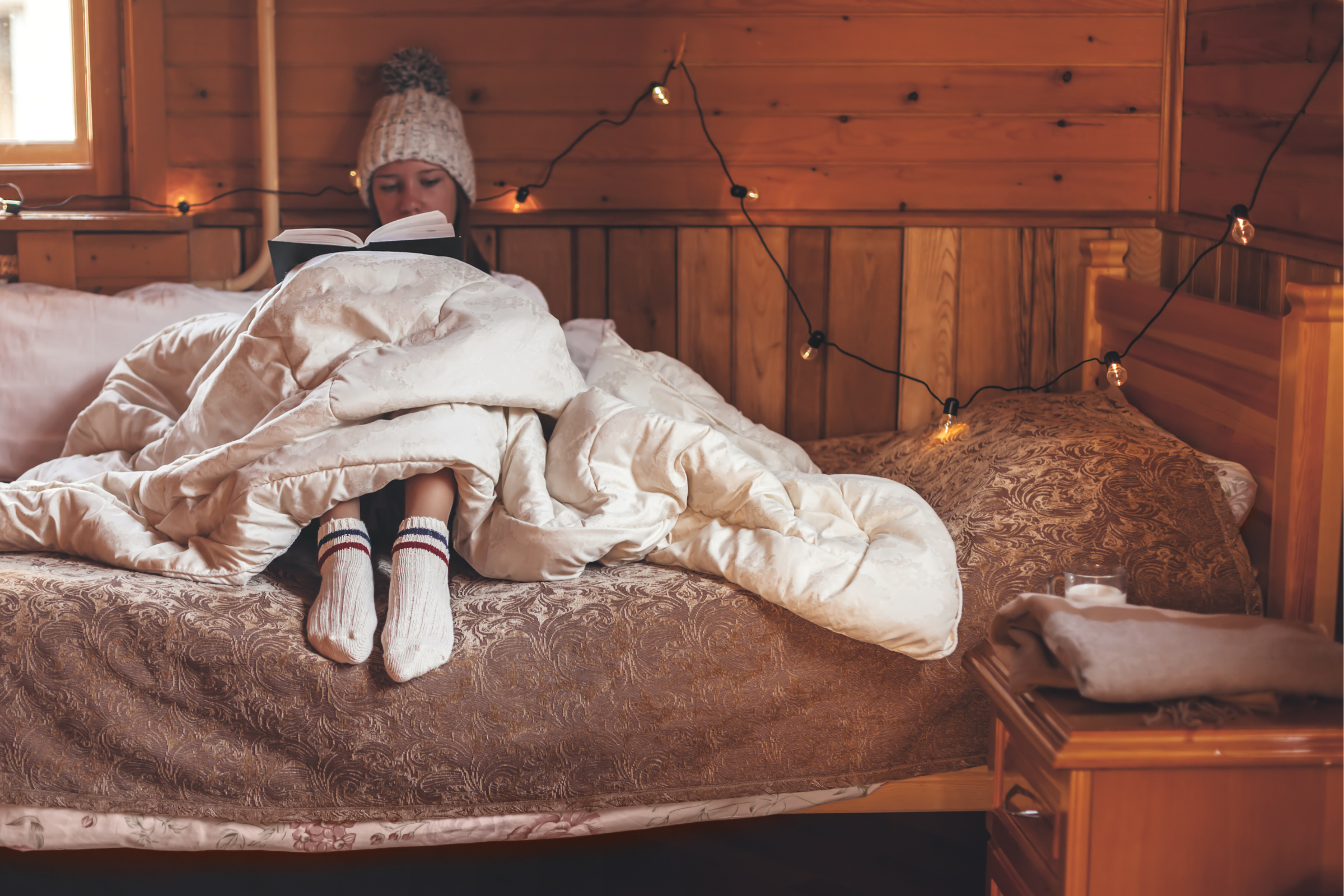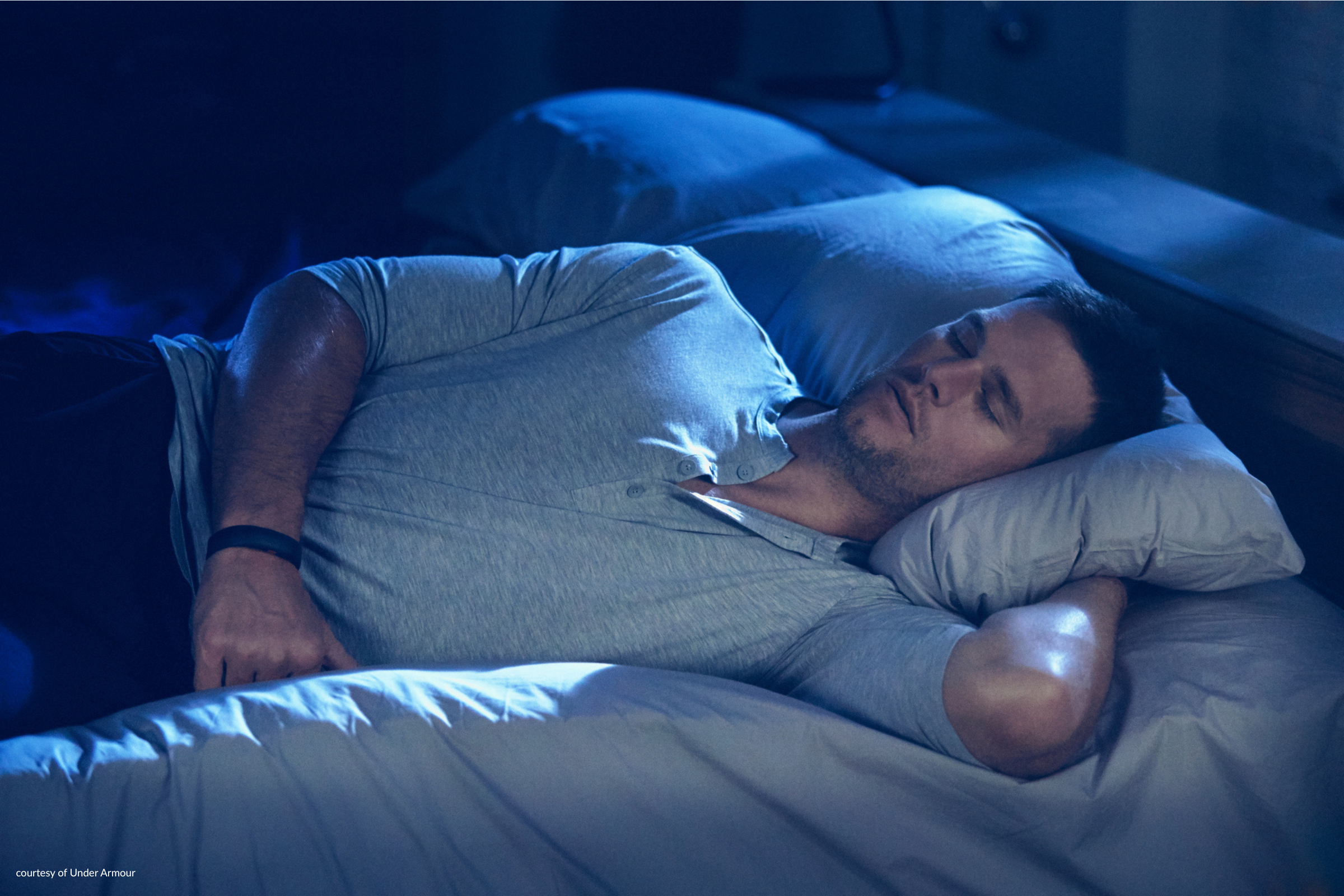With winter upon us, the shorter days and colder nights bring unique challenges and intriguing opportunities to your sleep and overall health. Some may find comfort in the season’s long, cozy nights as the perfect excuse to hibernate, while others find that winter throws off their sleep and fitness routine. From the darker days disrupting your circadian rhythm to colder weather and heavier meals, optimizing your sleep during winter takes a little extra effort. But winter also offers opportunities to realign with your natural rhythms and prioritize restorative rest. Here are some insights into how to make the most of the season for better sleep and overall well-being.
Rethinking Your Relationship with Darkness
The extended darkness of winter months has a profound impact on your body’s internal clock, or circadian rhythm. With less exposure to natural light, your brain produces more melatonin, which regulates sleep-wake cycles. This natural adjustment can cause excessive sleepiness during the day or difficulty waking in the morning.
Dr. Matthew Walker, author of Why We Sleep, explains, “Humans evolved to align their circadian rhythm with the sun’s cycles. In winter, when days are shorter, prioritizing morning light exposure becomes essential to avoid circadian drift.”
So understand that there's biological factors at play causing you to feel more sluggish in the dark winter mornings. To counteract this feeling, try to maximize morning light exposure when the sun rises. Experts recommend spending at least 15 minutes outside within an hour of waking.
Morning light exposure doesn’t just wake you up; it is also linked to telling your brain when to start winding down in the evenings. Missing this morning signal can create “social jetlag,” where your internal clock misaligns with when you ideally should be getting ready for bed.
Managing Temperature for Optimal Winter Sleep
Winter nights are colder, which can enhance sleep quality when managed correctly. That's because core body temperature naturally drops during sleep, signaling the body to transition into deeper stages of rest. However, it is key to find the right temperature that you can sleep at comfortably.
Dr. Shelby Harris, clinical psychologist and sleep expert, states, “Cold environments enhance deep sleep, but balance is key. A room that’s too cold or too warm can fragment your sleep cycle.”
In other words if you're not using the heater at all, you might wake up with your teeth chattering. Or on the other end if you're blasting the heat too aggressively you can disrupt your sleep by making bedrooms too warm or too dry.
Aim for a bedroom temperature between 60-67°F (15-20°C). Layer your bedding to adjust comfort levels, and consider pre-warming your bed with a heating pad so it's cozy when you hop in. Just be sure to remove or turn it off so you're not overheated in the night.
Dry winter air can also cause nasal irritation, making it harder to breathe. Using a humidifier to maintain 30-50% humidity can significantly improve sleep quality.
The Metabolic Impact of Holiday Feasting
Holiday meals tend to be rich, sugary, and late in the evening—a combination that is ripe to disrupt your sleep. That's because heavy meals delay melatonin release as your body prioritizes digestion over the onset of rest. Additionally, winter’s natural metabolic slowdown means your body processes these foods differently.
Peter Attia, MD, longevity expert, emphasizes, “The timing and composition of your last meal directly affect sleep quality. Focus on nutrient-dense, sleep-supportive foods in the evening.”
Shift heavy meals earlier in the evening, aiming to finish them at least three hours before bedtime. Include magnesium-rich foods like spinach, almonds, and dark chocolate, which support muscle relaxation and calm the nervous system. Limit alcohol consumption, as it reduces REM sleep and overall sleep efficiency.
Winter weight gain is often linked to disrupted sleep, and poor sleep increases cravings for high-calorie foods, creating a vicious cycle. So be sure to work on improving sleep quality to help regulate hunger hormones like ghrelin and leptin, to break this pattern.
Why Movement Matters More in Winter
Colder, darker days often lead to reduced activity levels, affecting physical health and sleep quality. But exercise has a profound impact on sleep, helping you fall asleep faster and spend more time in restorative deep sleep.
Morning workouts are particularly effective, as they anchor your circadian rhythm by exposing you to light and boosting energy levels. If outdoor movement feels daunting, opt for indoor activities like yoga, stretching, or Pilates, which relax muscles and lower stress hormones. Even a brisk 10-minute walk in the cold can improve your sleep that night.
And remember that timing matters. High-intensity workouts late in the evening raise core temperature and delay melatonin release, making it harder to fall asleep. Save intense sessions for the morning or afternoon and stick to lighter activities in the evening.
Sleep as a Tool for Recovery and Resilience
Winter naturally encourages rest and recovery, making it the perfect season to focus on building a strong sleep foundation. Sleep isn’t just about feeling rested; it’s critical for immune health, mood regulation, and athletic performance.
I like the way Peter Attia frames the importance of rest - “Sleep isn’t just the third pillar of health — it’s the foundation that supports the other two, diet and exercise.”
Track your sleep metrics using wearables like the Oura Ring or WHOOP to monitor sleep stages and identify patterns. Don't fixate on the data, but use it as a tool to help you implement positive changes into your routine. This could be limiting stimulants like caffeine after 2 p.m.; dimming the lights; engage in calming activities like reading or meditation; or investing in better sleep tools such as supportive pillows, blackout curtains, or white noise machines.
Winter’s slower pace provides a unique opportunity to refine long-term sleep habits. Small improvements in sleep quality during this season create compounding benefits throughout the year.
Final Thoughts
Winter offers a chance to embrace deeper rest, but it requires intentional adjustments. By aligning your sleep habits with the season’s natural rhythms—focusing on light exposure, temperature regulation, nutrition, and movement—you can unlock the restorative potential of winter sleep.
For more advanced sleep tips, check out Matthew Walker’s resources on sleep science, or explore Peter Attia’s insights on longevity and recovery. And if you’re ready to enhance your nightly routine, discover how Lagoon’s customizable pillows can support optimal sleep.







